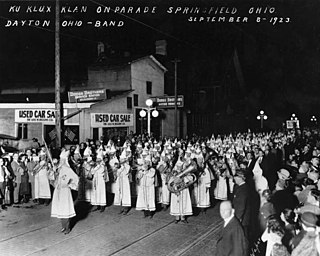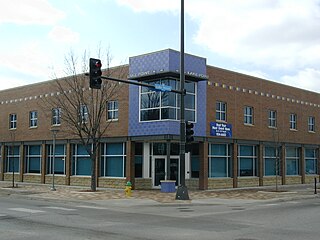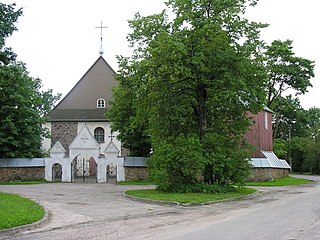
An orchestra is a large instrumental ensemble typical of classical music, which combines instruments from different families. There are typically four main sections of instruments:

Tempe is a city in Maricopa County, Arizona, United States, with the Census Bureau reporting a 2020 population of 180,587. The city is named after the Vale of Tempe in Greece. Tempe is located in the East Valley section of metropolitan Phoenix; it is bordered by Phoenix and Guadalupe on the west, Scottsdale and the Salt River Pima–Maricopa Indian Community on the north, Chandler on the south, and Mesa on the east. Tempe is also the location of the main campus of Arizona State University.

Frostburg is a city in Allegany County, Maryland. It is located at the head of the Georges Creek Valley, 8 miles (13 km) west of Cumberland. The town is one of the first cities on the "National Road", US 40, and the western terminus of the Western Maryland Scenic Railroad. It is part of the Cumberland metropolitan area.

Gelsenkirchen is the 25th-most populous city of Germany and the 11th-most populous in the state of North Rhine-Westphalia with 262,528 (2016) inhabitants. On the Emscher River, it lies at the centre of the Ruhr area, the largest urban area of Germany, of which it is the fifth-largest city after Dortmund, Essen, Duisburg and Bochum. The Ruhr is located in the Rhine-Ruhr metropolitan region, the second-biggest metropolitan region by GDP in the European Union. Gelsenkirchen is the fifth-largest city of Westphalia after Dortmund, Bochum, Bielefeld and Münster, and it is one of the southernmost cities in the Low German dialect area. The city is home to the football club Schalke 04, which is named after Gelsenkirchen-Schalke. The club's current stadium Veltins-Arena, however, is located in Gelsenkirchen-Erle.

Middletown is a city in Middlesex County, Connecticut, United States. Located along the Connecticut River, in the central part of the state, it is 16 miles south of Hartford. Middletown is the largest city in the Lower Connecticut River Valley Planning Region. In 1650, it was incorporated by English settlers as a town under its original Native American name, Mattabeseck, after the local Wangunk village of the same name. They were among many tribes along the Atlantic coast who spoke Algonquian languages. The colonists renamed the settlement in 1653.

A military band is a group of personnel that performs musical duties for military functions, usually for the armed forces. A typical military band consists mostly of wind and percussion instruments. The conductor of a band commonly bears the title of bandmaster or music director. Ottoman military bands are thought to be the oldest variety of military marching bands in the world, dating from the 13th century.
In Britain, a brass band is a musical ensemble comprising a standardized range of brass and percussion instruments. The modern form of the brass band in the United Kingdom dates back to the 19th century, with a vibrant tradition of competition based around communities and local industry, with colliery bands being particularly notable. The Stalybridge Old Band was formed in 1809 and was perhaps the first civilian brass band in the world.

The National Grange, a.k.a. The Grange, officially named The National Grange of the Order of Patrons of Husbandry, is a social organization in the United States that encourages families to band together to promote the economic and political well-being of the community and agriculture. The Grange, founded after the Civil War in 1867, is the oldest American agricultural advocacy group with a national scope. The Grange actively lobbied state legislatures and Congress for political goals, such as the Granger Laws to lower rates charged by railroads, and rural free mail delivery by the Post Office.
A community band is a concert band or brass band ensemble composed of volunteer (non-paid) amateur musicians in a particular geographic area. It may be sponsored by the local (municipal) government or self-supporting. These groups rehearse regularly and perform at least once a year. Some bands are also marching bands, participating in parades and other outdoor events. Although they are volunteer musical organizations, community bands may employ an Artistic Director (conductor) or various operational staff.

The nadir of American race relations was the period in African-American history and the history of the United States from the end of Reconstruction in 1877 through the early 20th century, when racism in the country, and particularly anti-black racism, was more open and pronounced than it had ever been during any other period in the nation's history. During this period, African Americans lost access to many of the civil rights which they had gained during Reconstruction. Anti-black violence, lynchings, segregation, legalized racial discrimination, and expressions of white supremacy all increased. Asian Americans were also not spared from such sentiments.

The United Keetoowah Band of Cherokee Indians in Oklahoma is a federally recognized tribe of Cherokee Native Americans headquartered in Tahlequah, Oklahoma. According to the UKB website, its members are mostly descendants of "Old Settlers" or "Western Cherokees," those Cherokees who migrated from the Southeast to present-day Arkansas and Oklahoma around 1817. Some reports estimate that Old Settlers began migrating west by 1800, before the forced relocation of Cherokees by the United States in the late 1830s under the Indian Removal Act.

North Omaha is a community area in Omaha, Nebraska, in the United States. It is bordered by Cuming and Dodge Streets on the south, Interstate 680 on the north, North 72nd Street on the west and the Missouri River and Carter Lake, Iowa on the east, as defined by the University of Nebraska at Omaha and the Omaha Chamber of Commerce.

A brass band is a musical ensemble generally consisting primarily of brass instruments, most often with a percussion section. Ensembles that include brass and woodwind instruments can in certain traditions also be termed brass bands, but may be more correctly termed military bands, concert bands, or "brass and reed" bands.

Židikai is a town in Mažeikiai district municipality, Lithuania. It is located 21 km west of Mažeikiai. Židikai is the seat of Židikai elderate. Židikai is known for being the home of Marija Pečkauskaitė

Frostburg State University (FSU) is a public university in Frostburg, Maryland. The university is the only four-year institution of the University System of Maryland west of the Baltimore-Washington passageway in the state's Appalachian highlands. Founded in 1898 by Maryland State Senator, John Leake, Frostburg was selected because the site offered the best suitable location without a cost to the state. Today, the institution is a largely residential university.
RMIT Link is a division of the Royal Melbourne Institute of Technology (RMIT) around student life and historically was an unincorporated entity, the campus union of the RMIT in Melbourne, Victoria, Australia. It was formed in 1968 and currently consists of the following branches: Arts and Culture, Sport, City Fitness, "Recreation", "Orientation and Transition" and Administration.

Christ's Sanctified Holy Church is a Methodist denomination aligned with the holiness movement. It is based in the Southeastern United States. The group was organized on February 14, 1892, by members of the Methodist Episcopal Church on Chincoteague Island, Virginia, under the leadership of Joseph B. Lynch. Christ's Sanctified Holy Church teaches that the fullness of salvation is obtained through two works of grace: (1) the New Birth and (2) experiencing the "second blessing," i.e. entire sanctification. Christ's Sanctified Holy Church grew significantly during the first part of the 20th century as members traveled across the country preaching the doctrine of holiness (sanctification). At its early stages the movement was known as the Sanctified Band, Sanctification Band, or Lynchites.

The Pechanga Band of Indians, also known as Payómkawichum, stand as 1 of 6 federally recognized tribes of Luiseño Indians, currently located in Riverside County, California. The modern understanding of the tribe, Pechanga, meaning "the place where water drips," comes from the displacement of the tribe during their eviction from Temecula in 1875, resulting in movement towards a secluded valley near a spring called Pecháa'a.

The Socialist Labor Party (SLP) is a political party in the United States. It was established in 1876, and was the first socialist party formed in the country.
The Bearkat Marching Band, also known as The Famous Bearkat Band or the BMB, is the marching band at Sam Houston State University. The band was founded in 1910 under the direction of C.W. Feuge, and is currently directed by Brian Gibbs. The band appears at Sam Houston football and basketball home games, as well as at pep rallies, the annual Battle of the Piney Woods in Houston, and occasionally at in-state away games.















